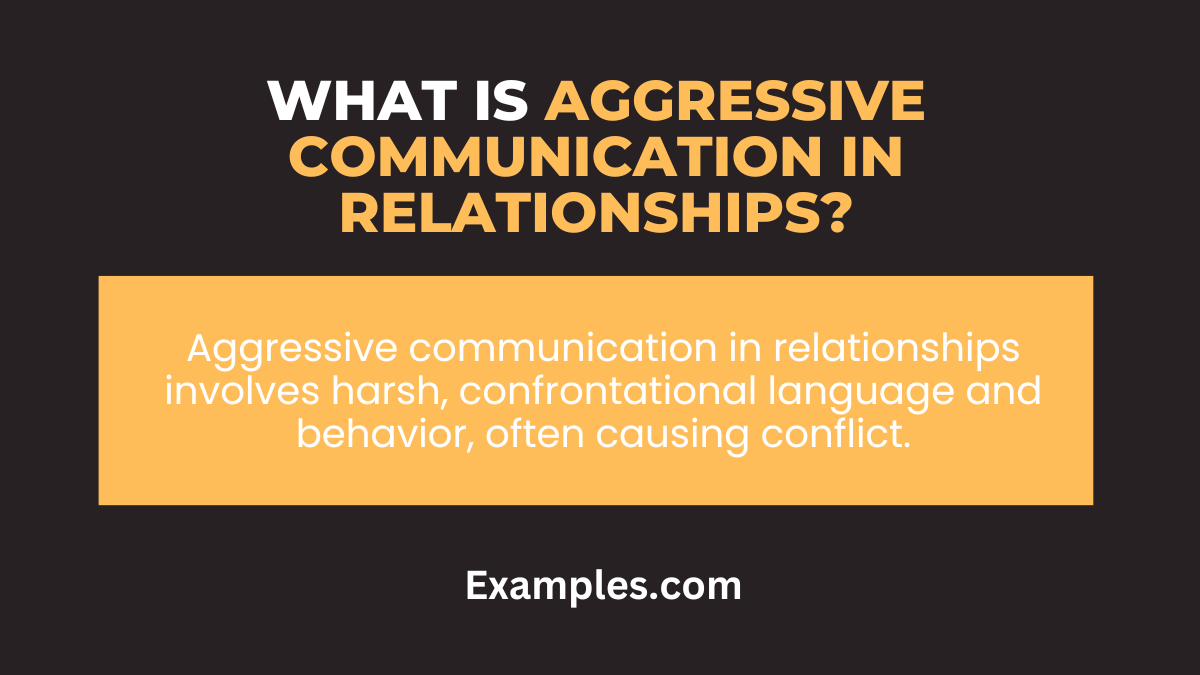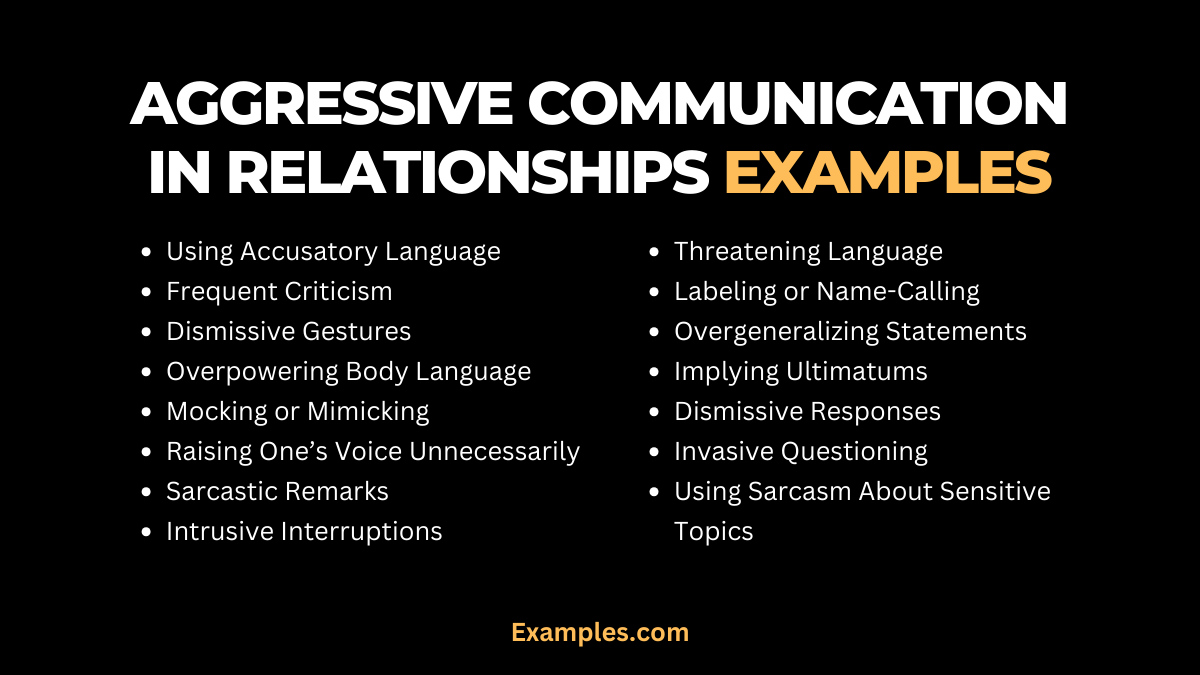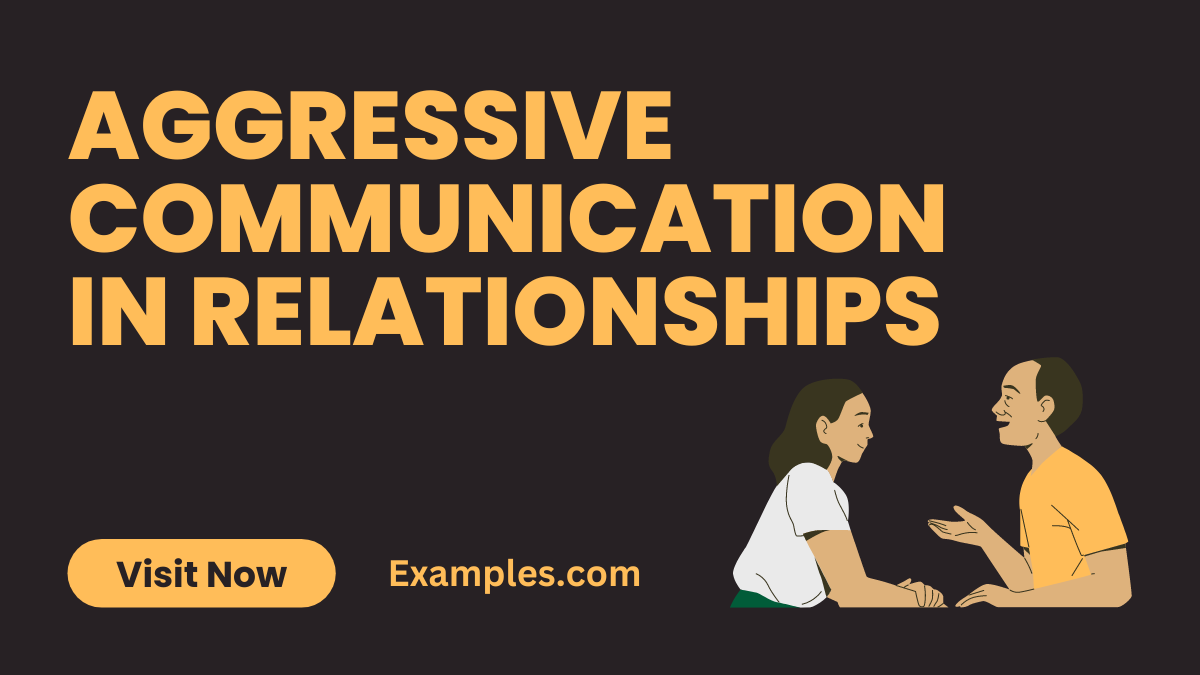14+ Aggressive Communication in Relationships Examples
Aggressive communication in relationships often creates a barrier to understanding and empathy. This guide delves deep into such interactions, providing real-life examples and strategies to shift towards more effective and passive communication methods. By recognizing aggressive patterns, individuals can learn to express themselves more constructively, fostering healthier and more fulfilling relationships. This comprehensive overview serves as an essential resource for anyone seeking to improve their interpersonal communication skills.
What is Aggressive Communication in Relationships?

Aggressive communication in relationships is a style marked by assertiveness taken to an extreme level, often resulting in a confrontational and dominating approach. This type of communication typically involves blunt or harsh language, a raised tone of voice, and can include nonverbal cues like aggressive body language. Unlike assertive communication, which is direct yet respectful, aggressive communication tends to override the feelings and opinions of others, leading to potential conflicts and strained relationships. Understanding this communication style is crucial for identifying and modifying such behaviors for more harmonious interactions.
15 Aggressive Communication in Relationships Examples

- Using Accusatory Language: Aggressive communicators often use accusatory language, which can make the other person feel defensive. Example: Instead of saying, “You always ignore me,” try “I feel overlooked when I don’t get a response.”
- Frequent Criticism: Constant criticism can undermine the other’s self-esteem. Example: Replace critical remarks with constructive feedback like, “I think this could be improved by…”
- Dismissive Gestures: Rolling eyes or smirking can convey disrespect. Example: Maintain neutral facial expressions and say, “Let’s discuss this matter seriously.”
- Overpowering Body Language: Standing too close or pointing fingers can be intimidating. Example: Keep a respectful distance and say, “I’d like to understand your point of view.”
- Mocking or Mimicking: Mocking someone’s words or actions can be hurtful. Example: Speak earnestly and say, “I respect your opinion, even if I disagree.”
- Raising One’s Voice Unnecessarily: This can create a hostile environment. Example: Keep a calm tone and say, “I’m passionate about this topic, but I’ll speak calmly.”
- Sarcastic Remarks: Sarcasm can be damaging and belittling. Example: Be direct and say, “I disagree with this, and here’s why…”

- Intrusive Interruptions: Interrupting signifies a lack of respect. Example: Allow them to finish and then say, “Now that you’ve expressed your view, here’s mine.”
- Threatening Language: Using threats can escalate conflicts. Example: Instead, say, “I’m concerned about this issue, let’s find a solution.”
- Labeling or Name-Calling: This can be emotionally hurtful. Example: Focus on the behavior, not the person, and say, “This action was not okay with me.”
- Overgeneralizing Statements: Statements like “You always…” can be unfair. Example: Be specific, saying, “I was upset when this happened today.”
- Implying Ultimatums: This puts pressure on the other person. Example: Offer choices by saying, “I think we have a few options here.”

- Dismissive Responses: Not acknowledging someone’s feelings is aggressive. Example: Show empathy, saying, “I understand how you feel about this.”
- Invasive Questioning: Bombarding someone with questions can be overwhelming. Example: Ask calmly, “Can we talk about what happened?”
- Using Sarcasm About Sensitive Topics: This can deepen wounds. Example: Address sensitive topics with care, saying, “I realize this is a delicate subject.”
How to Deal with Aggressive Communication in Relationships?
- Recognizing the Signs: The first step in dealing with aggressive communication is to recognize its signs. Look for patterns of interpersonal communication issues, such as frequent interruptions or raised voices. Understanding these cues helps in addressing the problem more effectively.
- Developing Assertive Communication Skills: Replace aggressive communication with assertive communication. This involves expressing your feelings and needs clearly and directly, but without being aggressive. Learning this skill can significantly improve the way you interact in relationships.
- Active Listening Techniques: Active listening is a cornerstone of effective communication. It involves giving full attention to the speaker, understanding their message, and responding thoughtfully. This approach can help de-escalate aggressive situations.
- Setting Boundaries: It’s important to set clear boundaries in any relationship. If your partner’s communication becomes aggressive, calmly express how this affects you and what behavior you will not tolerate. Boundaries are a crucial part of healthy interpersonal communication.
- Seeking Professional Help: Sometimes, the guidance of a therapist or counselor skilled in therapeutic communication can be invaluable. They can provide strategies and tools to help both partners communicate more effectively and replace aggressive patterns with healthier ones.
Examples of Aggressive Communication in Relationships
- Domineering Tone: An aggressive communicator often uses a domineering tone, which can intimidate the other person. This lack of empathetic communication can lead to misunderstandings and conflicts.
- Blaming and Accusations: Frequently blaming or accusing the partner without considering their perspective is a common example of aggressive communication. This behavior disrupts effective communication and creates a hostile environment.
- Nonverbal Intimidation: Aggressive communication isn’t just about words. Body language like glaring, eye-rolling, or invading personal space are nonverbal forms of aggressive behavior that impede good communication skills.
- Sarcasm and Mockery: Using sarcasm or mockery, especially about sensitive issues, is a form of aggressive communication. It can deeply hurt the partner and hinder open communication in the relationship.
- Interrupting and Not Listening: Consistently interrupting or not listening to the partner’s perspective is a clear sign of aggressive communication. This behavior shows a lack of respect and passive communication skills.
Importance of Aggressive Communication in Relationships
- Understanding Relationship Dynamics: Acknowledging the role of aggressive communication is essential for understanding the dynamics of a relationship. It highlights the need for improving communication skills and developing more passive communication methods.
- Promoting Healthy Interactions: By recognizing aggressive communication patterns, couples can work towards more effective communication. This change is crucial for building a healthier, more respectful relationship.
- Conflict Resolution: Understanding the impact of aggressive communication helps in resolving conflicts more constructively. It encourages the development of assertive communication techniques that are key to resolving disputes amicably.
- Personal Growth: Addressing aggressive communication in relationships contributes to personal growth. It fosters self-awareness and the development of interpersonal communication skills that are beneficial in all aspects of life.
- Creating a Supportive Environment: Transforming aggressive communication into more passive and respectful forms helps create a supportive and nurturing environment. This change is vital for the emotional well-being of both partners.
Understanding and addressing aggressive communication in relationships is key to fostering healthier interactions. This guide offers valuable insights into identifying aggressive patterns, transitioning to more passive and effective communication styles, and nurturing mutual respect. Embracing these principles and examples can lead to more meaningful and harmonious relationships, enhancing both personal growth and emotional well-being.



